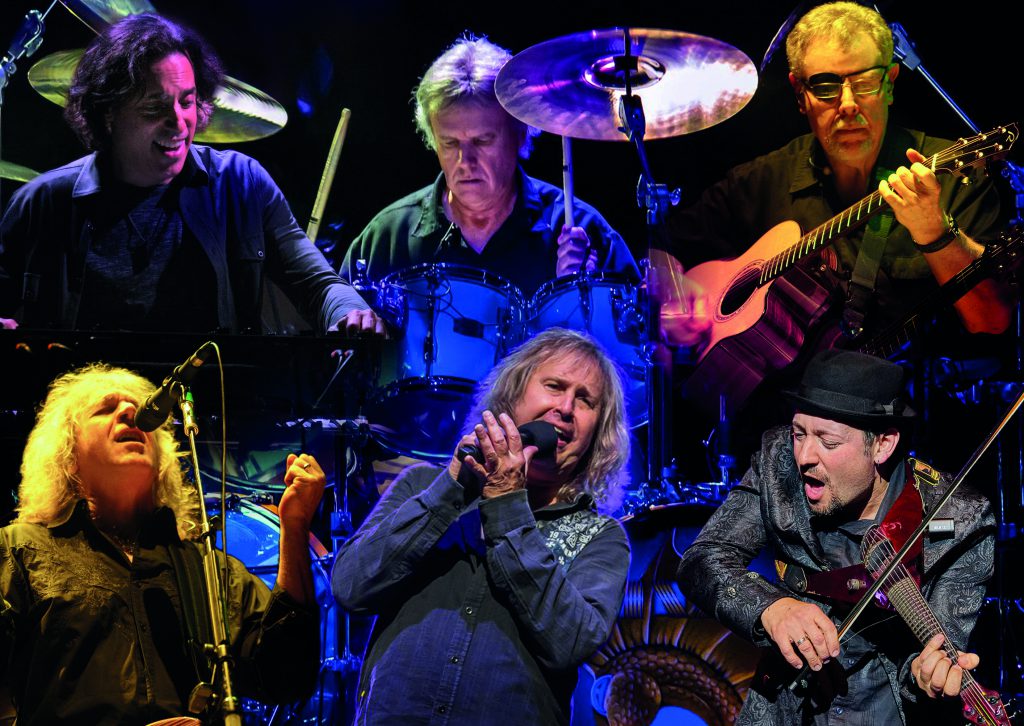INTERVIEW: Richard Williams on 50 electric years with Kansas

Kansas, courtesy.
Over the course of its five decades, prog rocker group Kansas has experimented with just about all the stage production gimmicks. The band, which got its start in Topeka, Ka. in 1973, has tried lasers, pyrotechnics and even a stunt so dangerous that KISS passed it up.
Kansas
8 p.m., Thursday, Sept. 14
Golden Gate Theatre, 1 Taylor St., S.F.
Tickets: $72 and up.
Get Another Fork in the Road – 50 Years of KANSAS on Amazon.
Lasers are more hassle than they’re worth, founding guitarist Richard Williams explained. There’s too many rules about how they can be used, and they’re too pricey to drag around the country for a few minutes of use at each show. Using them longer than that makes them boring, Williams said during a video call from his home in rural North Carolina on the morning of his birthday in February.
Pyrotechnics is something Kansas used to experiment with—a couple of times to near catastrophic consequences to the late Robby Steinhardt, the band’s founding violinist and singer. At the end of one show in the early ‘80s—Williams doesn’t remember which city—Steinhardt was at the front of the stage saying “thank you and goodnight!” but didn’t move far enough away from the pyro device.
“He didn’t know it, but his head was on fire,” Williams recalled. “I ran over there. I’m beating him on the back of the head putting out the fire. Robby had that gigantic mop of hair. … That much hair, when it burns, it just turns into this glob of molten jelly that turns hard like plastic.”
But that’s not even Kansas’ most Spın̈al-Tap-like moment. At one point, the band had a lightning machine. At its best, it blew out each venue’s—Kansas was playing arenas then—P.A. system subwoofers.
“Poor Robby, being in the center of the stage, was always the one in proximity,” Williams explained. “It was this machine that KISS had tried to use and turned it down, and we got it. There was a little electrode thing they put on the tip of his bow. This giant machine in the background was building up all this energy.
“There was a point up on the lighting truss, and in this song called ‘Lightning’s Hand,’ he would point [the bow] up as they flipped the switch, you know—’I command the lightning’s hand!’—and it would send this bolt of lightning down,” he continued. “Well, it really probably hadn’t been sufficiently tested, because it jumped from the bow and bit him on the neck. That put him on the ground.”
Kansas steers clear of pyrotechnics these days. On the band’s 50th anniversary tour, which includes an initial 50 shows in 50 cities, Williams, cofounding drummer Phil Erhart, long-timers Ronnie Platt, Tom Brislin, Billy Greer; and newest member Joe Deninzon (who just replaced the departing David Ragsdale), will continue to stick with a more theatrical approach to lighting. Williams said the band first picked it up from watching Genesis play a mid-size Kansas City Theater in 1974. That is, that dramatics can be created without over-the-top production and just the right amount of lighting.
“I’m not gonna stick a candlestick up my butt and light it on fire and hop around on the stage,” the straight-shooting Williams said. “We’re not Van Halen. We don’t need to do that type of show.”
Kansas’ 50th anniversary “Another Fork in the Road” Tour will celebrate the group’s 16 studio albums. Since releasing its first in 1974, the band ushered in prog rock with three six-times-platinum albums, a platinum live album, eight gold albums, quadruple-platinum single “Carry On Wayward Son” and triple-platinum single “Dust in the Wind.”
The band has sold 30 millions albums and counting. Both of its two recent albums, 2016’s The Prelude Implicit and 2020’s The Absence of Presence, charted.
The upcoming tour was preceded by a new three-disc complication, Another Fork in the Road – 50 Years of KANSAS, on InsideOutMusic.
Richard Williams on playing with former Kansas bandmates on the 50th anniversary tour:
“With this tour, there are no closed doors [to former members like Steve Walsh and others]. If we’re in Kansas and [original guitarist] Kerry [Livgren] comes up to play, the door is open. If we’re in Florida and [original bassist] Dave Hope wants to come up, please come up! We would love it. If we’re in Nashville and [early ‘80s lead vocalist] John Elefante wants to join in, let us know! And we will be reaching out to these people to let them know that any time they want to be a part of this, they’re not only welcome to, but we really want them to. The ball is in their court, and we’re all friends. We all get along. I think some or all very well could do it.”
The record is dedicated to Steinhardt, who died in 2021 at 71, and incorporates the band’s hits, which include “Point of Know Return” and “Play the Game Tonight,” deeper cuts like “Down the Road,” “Journey from Mariabronn” and “Miracles Out of Nowhere,” and a bit of the newer material.
It begins with a new version of Kansas’s first single, “Can I Tell You,” which Richard Williams cowrote. Kansas has had numerous lineup changes throughout the years, and Williams said the goal with recording a new version was to connect the dots from the band’s origins to where it is today.
“‘Can I Tell You’ is the song that got [producer] Don Kirshner’s ear. His was the only offer we ever got,” Williams said. “We would have never made the first record. … That song brought us to the table. In that respect it was the most important song we ever had.”
The new recording is a bookend, for now, he said. He and his bandmates wanted to record it as closely to the original arrangement as possible.
The tour setlists will include songs largely from the new compilation in an attempt to represent each Kansas era, Williams said. He credited representatives from the label with inspiring and running lead on the project and coming at it from a fan’s perspective. The band will be playing some songs it hasn’t touched in decades.
“Some of these guys have never played some of these songs,” Williams said. “They’re more than capable, and it will be represented in its truest form.”
Playing new material and songs the band hasn’t played in decades will always be more exciting, Richard Williams said, because there’s an uncertainty of whether he and his bandmates will pull off their parts, which creates an unmatched energy.
“It’s palatable and you feel it. You can see it on the stage,” he said. “The crowd can hear it. It’s a different excitement of stretching out into a bit of the unknown.”
These days, Williams said he also cherishes every time he gets to go out and play Kansas classics for others. That wasn’t the case 25 years ago, and he was sick of having to repeat “Point of No Return” night in and night out. Eventually, he said, he had to take a step back and have an internal conversation and recenter himself.
He came to find new challenges for himself that included playing the song more proficiently.
“I taught myself a lesson: ‘Be grateful you’re here,’” he said. “There’s hundreds of thousands of guitar players that are a lot better than me that would cut a nut off to switch places with me.”
Richard Williams has no plans of giving the band up, and he said Phil Erhart feels the same way. The two met in high school in 1967 and played in the band that led up to Kansas, White Clover. The two have been connected at the hip ever since then, he said.
“There’s a loyalty and trust that is understood and assumed. For two different people, we’re also very the same in what we want,” he said.
Kansas has been writing, and he said he expects that sometime in 2024, the band will have enough material to begin recording another album.
The word “retirement” isn’t in Williams’ vocabulary. He said he was raised by his parents with the Midwestern value of seeing things through all the way. He’s not sure what he’d do with himself apart from the band, anyway.
“And do what, play golf? Sit around and play gin rummy with the guys?” he said. “My friends are the road crew. My friends are the guys in the band. We’ve been living up here in North Carolina for two years now, and the only person I know up here is our real estate agent. I can’t relate to civilian life. … And I’m OK with that.”
Follow editor Roman Gokhman at Twitter.com/RomiTheWriter.

